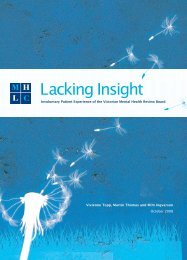Reducing Ethnic Profiling in the European Union - Open Society ...
Reducing Ethnic Profiling in the European Union - Open Society ...
Reducing Ethnic Profiling in the European Union - Open Society ...
- No tags were found...
Create successful ePaper yourself
Turn your PDF publications into a flip-book with our unique Google optimized e-Paper software.
sometimes add<strong>in</strong>g factors such as a person appear<strong>in</strong>g “nervous,” or “out of place”or “strange.” 178 The research found that while stops may be called <strong>in</strong> to headquarters,<strong>the</strong>y were generally not reviewed by l<strong>in</strong>e supervisors at local stations, nor were<strong>the</strong>y systematically recorded and assessed <strong>in</strong> terms of efficiency, meet<strong>in</strong>g operationalobjectives, or fairness.Qualitative data can be powerful <strong>in</strong> <strong>in</strong>dicat<strong>in</strong>g whe<strong>the</strong>r ethnic profil<strong>in</strong>g is tak<strong>in</strong>gplace and, and if so, illum<strong>in</strong>at<strong>in</strong>g <strong>the</strong> factors that abet it. Some qualitative data ga<strong>the</strong>r<strong>in</strong>gis complex and expensive. Where resources might not be available to replicate <strong>the</strong>types of qualitative research described above, more limited approaches can be adopted,perhaps <strong>in</strong> conjunction with community polic<strong>in</strong>g <strong>in</strong>itiatives. The follow<strong>in</strong>g three casestudies provide important examples of an easily-replicated first step <strong>in</strong> ga<strong>the</strong>r<strong>in</strong>g qualitativedata.BELGIUMRoundtables on Community Polic<strong>in</strong>g <strong>in</strong> Diverse NeighborhoodsIn 2006–2007, <strong>the</strong> Centre for Police Studies organized 11 roundtable discussions <strong>in</strong>different prov<strong>in</strong>ces to exam<strong>in</strong>e <strong>the</strong> practical implementation of community orientedpolic<strong>in</strong>g <strong>in</strong> diverse communities. Each roundtable exam<strong>in</strong>ed police relations with adifferent segment of society, <strong>in</strong>clud<strong>in</strong>g Travellers, trailer park residents, and ethnicm<strong>in</strong>orities.Participants at each roundtable <strong>in</strong>cluded police officers, community actors whowork with <strong>the</strong> selected segment of society (such as social workers and educators),and representatives of <strong>the</strong> selected group. In many cases this was <strong>the</strong> first time<strong>the</strong>se actors had exchanged views about polic<strong>in</strong>g. Participants, who were guaranteedanonymity, were <strong>the</strong>n asked to write out a short reflection on <strong>the</strong> discussion outl<strong>in</strong><strong>in</strong>g<strong>the</strong> implications for <strong>the</strong>ir work and not<strong>in</strong>g ideas and thoughts that <strong>the</strong> discussionprovoked. The project concluded with a workshop titled “Polic<strong>in</strong>g Divided Communities”which brought toge<strong>the</strong>r project participants to discuss experiences <strong>in</strong> differentprov<strong>in</strong>ces, draw<strong>in</strong>g out <strong>the</strong> implications for community oriented polic<strong>in</strong>g.REDUCING ETHNIC PROFILING IN THE EUROPEAN UNION 97
















